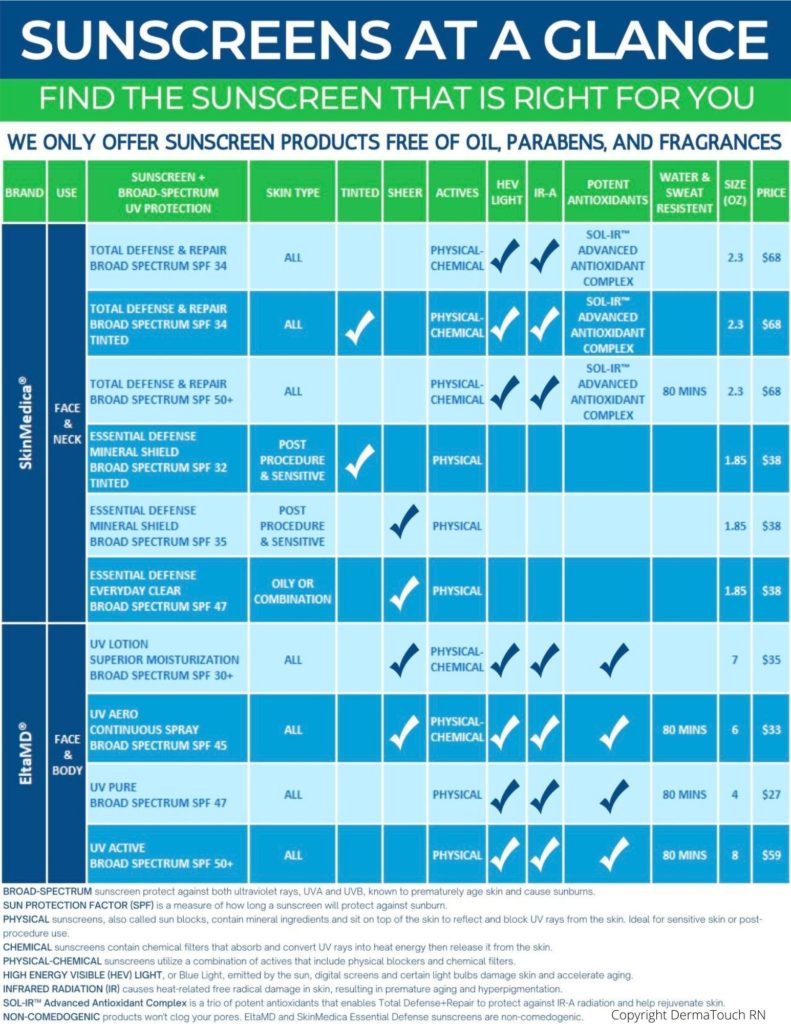You might not be able to see it with the naked eye, but light is made up of different colors. The colors are made up of different wavelengths that range from long to short. Longer wavelengths give off lower energy, and shorter wavelengths give off higher energy. Ultraviolet (UV) light falls on the short wavelength end of the spectrum and gives off a lot of energy.
We are used to hearing that we need to protect ourselves from Ultraviolet light. UVA and UVB rays are the rays we often think of when we think of the sun or tanning beds. UV light from the sun and tanning beds can lead to sun damage to the skin. Sun damage can then lead to premature aging of the skin and skin cancer. UV rays can also damage the front and back of the eyes, leading to cataracts and age-related macular degeneration (AMD).
Now, researchers are starting to find concern in wavelengths that sit right next to UV rays. These wavelengths are often referred to as High Energy Violet (HEV) or “blue light” rays. They don’t give off quite as much energy as UV rays to, but they still give off a lot of energy.
Where does blue light come from?
Blue light is all around us, and we come face to face with it daily. The sun, electronic devices, digital screens, LED lighting, and fluorescent lighting all give off HEV rays. If you sit in front of a computer all day long, your face is continually exposed to blue light. In fact, TVs, smartphones, laptops, desktops, and tablets all give off blue light.
How does blue light impact your skin?
It’s been known for some time that watching TV and staring at your smartphone or computer screen for long periods can have a negative impact on the eyes. Blue light can cause eye damage and can also disturb sleep patterns when exposed to it late at night due to its effect on melatonin, which helps to regulate sleep. Recent research indicates that the skin is also negatively impacted by constant exposure to blue light.
The research conducted on blue light suggests that its effects can cause long-term damage and promote the stimulation of free radicals in the skin. Blue light has been shown to promote aging stressors in the skin and cause hyperpigmentation, inflammation, and weakening of the skin’s surface.
How can you protect your skin and body from blue light damage?
If you want to prevent premature aging, protecting your skin from blue light rays is just as important as protecting your skin from UVA and UVB rays. Limiting your exposure to blue light rays is also important to take care of your eyes and support overall wellbeing by maintaining healthy sleep patterns.
Blue Light Sunscreen Protection
Just as sunscreen is formulated to protect the skin against UVA and UVB rays, many sunscreens are now formulated to protect against blue light, as well. Look at labels to find a sunscreen that protects against UVA, UVB, and HEV rays.
Some sunscreens sold by Houston DermaTouch RN that are formulated to help protect against HEV light include:
- SkinMedica’s Total Defense & Repair Broad Spectrum SPF 34
- SkinMedica’s Total Defense & Repair Broad Spectrum SPF 34 Tinted
- SkinMedica’s Total Defense & Repair Broad Spectrum SPF 50+
- EltaMD UV Lotion Superior Moisturization Broad Spectrum SPF 30+
- EltaMD UV Aero Continuous Spray Broad Spectrum SPF 45
- EltaMD UV Pure Broad Spectrum SPF 47
- EltaMD UV Active Broad Spectrum SPF 50+
Skincare Products & Aesthetic Treatments
Some of the best skin care tips include using high quality skincare products. High quality skincare can help to repair sun damage and blue light damage to the skin. Products such as SkinMedica’s TNS and TNS Advanced+ Serum are good options for repairing the skin and reducing the signs of aging.
Aesthetic treatments can also help to reduce the signs of aging and heal and repair the skin. For example, the Halo laser therapy and Broadband Light (BBL) can help reduce the appearance of age spots, improve skin texture and tone, reduce the appearance of pores, and more.
Protective Glasses and Clothing
Using blue light blocking glasses throughout the day, especially if you’re on digital devices for long periods of time, can protect your eyes from blue light damage.
When outdoors, polarized sunglasses can protect you from blue light rays. Wearing a hat can help, as well. Both of these options help to protect against UVA and UVB rays, also.
Disable Blue Light on Devices
Many smartphones and tablets now come with a setting where you can choose to disable blue light to reduce your exposure to it. By selecting this setting, you’re helping to protect your eyes and skin from exposure to blue light from that device. Lowering the brightness on digital devices can also reduce the level of HEV rays emitted from them, reducing your exposure.
Avoid Exposure to Blue Light before Bed
It’s best to avoid blue light on digital devices a few hours before bed to help you get a good night’s sleep and support your body’s natural rhythm and melatonin production. Many smartphones have a “night” setting that reduces the level of light your devices give off to help reduce exposure to blue light late at night, as well.
Get Skin Care Tips and More from DermaTouch RN
If you’re looking for skin care tips on how to protect and heal your skin, the team of skin care experts at DermaTouch RN can help. We offer top-of-the-line Houston skincare, like SkinMedica products. You can purchase SkinMedica in Houston in our clinic or online 24/7. In addition, we offer some of the most popular and effective cosmetic and aesthetic treatments on the market for you to look and feel your best.
DermaTouch RN is also #1 provider of Houston Botox and Juvederm dermal filler treatments. You can contact us online or by phone or text at 281.895.9090 to book an appointment or consultation.
Resources:
https://www.sleepfoundation.org/articles/melatonin-and-sleep
https://www.ncbi.nlm.nih.gov/pmc/articles/PMC4337113/
https://preventblindness.org/blue-light-and-your-eyes/
DermaTouch RN offers minimally invasive and non-invasive treatments for men and women in Houston, San Antonio, Spring and Cypress, as well as the surrounding areas of Texas. We are the largest aesthetic practice in the Houston area, and all of our medical spa treatments are performed by a team of nurse practitioners, registered nurses, and aestheticians who receive continuing education to remain abreast of emerging treatments that benefit our patients. We invite you to learn more about our office before your consultation.






